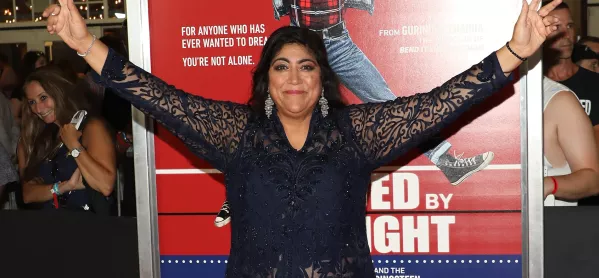I loved going to school, absolutely loved it - the camaraderie, hanging out with other girls - and I loved pop music. I used to record the top 40 every week and make my own DJ tapes, with me talking between tracks.
But I didn’t really understand the concept of studying hard, like kids do now. I needed to retake my A levels because I got such poor grades. If you knew what I got for English - oh my God.
But my passion, my favourite subject at school, was geography. It was the one subject where I was able to have an international perspective on the world and talk about different cultures.
Standing on my own two feet
For my dad, the most important thing was that I went to university and got a degree, so I could stand on my own two feet and be financially independent. He didn’t care what career path I chose, but he wanted me not to rely on a man for money or anything.
I knew I wanted to do something involving geography, so I found a course in development studies at the University of East Anglia and showed the prospectus to the careers teacher at school. She said, “Mmm, I think you’re aiming a bit high. You would do better on a secretarial course.”
As a 17-year-old, I wanted to slap her around the face. I thought, “You think I’m not good enough. You can’t understand why someone like me, being Indian, would want to do a course about the Third World. But I’m going to prove you wrong.” I have got the careers woman to thank for that fighting spirit.
But I didn’t get the grades I needed in English, so I had to retake. At South London College, I had to take another subject, as well as English. I chose sociology. I didn’t know much about it. I just thought, “This sounds interesting.”
My inspirational teacher
Barry Sedgwick, the sociology teacher at South London College, was the best teacher I have ever had. He was my political education. On the first day, he said, “You are all here to pass an exam. Obviously, I’ve got to inspire and educate you. But the whole purpose you’re here is to pass an exam. There is a method to this. I’m going to teach you to answer exam questions.” And I just said, “Wow.”
Once he got that out of the way, his classes were the most inspiring educational situation I have ever been in. He took each topic and divided it into three different ways of looking at it: the traditionalist perspective, the phenomenologist perspective and the Marxist perspective. See, I remember it even now.
You can take any subject, apply these three perspectives to it, and you will understand how the world works. To this day, I apply this to everything, and I have a clear idea of what is going on.
Different perspectives
There was a mature student in our class, and they used to have such fights about the Russians invading Czechoslovakia and so on. A lot of it went over my head, but I realised that you can look at the world from different perspectives. When I make a film about a particular subject matter, it will look different from other people’s films.
Barry Sedgwick enabled me to look at these different perspectives, then come to my own conclusions about what is going on. That gave me the tools to make sense of my British-Asian identity and my place in society.
I hope he goes to the pictures now to see my films, and takes some credit for them.
Gurinder Chadha is the director of Blinded by the Light, in cinemas now. Her previous films include Bend It Like Beckham and Bhaji on the Beach. She was talking to Adi Bloom




